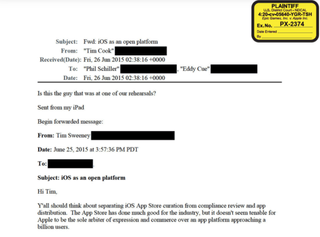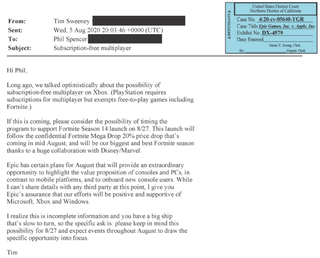Apple vs. Epic Games: The biggest secrets revealed so far
We finally learn how much money the Epic Games Store is losing when it gives away free games

The Apple vs. Epic Games trial kicked off this week, and the outcome is certain to shake up the tech world.
Apple's App Store business model is at stake. Epic argues that Apple is breaching antitrust laws by (among other things) not letting developers take in-game payments through iOS apps without giving Apple a 30% cut of the proceeds.
Apple says that its 30% cut of App Store revenue is in line with standard revenue-sharing arrangements on other digital storefronts, including Steam and the Google Play store.
The iPhone maker is also pushing back against Epic's claim that Apple has a monopoly on a large portion of smartphone users by arguing that the App Store faces competition from other smartphone and console platforms.
- Want to game on a phone? Here are the best gaming phones
- And here are the best gaming PCs
- Plus: Apple vs Epic Games: What the trial of the century means for you
This all started brewing last August, when Epic quietly updated the iOS version of Fortnite with an option for players to buy in-game currency directly from Epic at a slight discount compared to what it cost to buy the currency through Apple's payment system.
Apple responded by kicking Fortnite out of the App Store, and Epic's lawyers went to work putting together the lawsuit that's currently playing out.
We'll have to wait and see who wins, but in the meantime we stand to learn a lot about each company's business, as Apple and Epic filed pre-trial fact findings in separate documents of more than 300 pages each.
Sign up to get the BEST of Tom’s Guide direct to your inbox.
Upgrade your life with a daily dose of the biggest tech news, lifestyle hacks and our curated analysis. Be the first to know about cutting-edge gadgets and the hottest deals.
Both documents are now publicly available online — you can read Epic’s here and Apple’s here. To save you time, we've pulled together some of the juiciest insights below.
Apple execs saw this coming a decade ago
One of the documents made public as part of the pre-trial fact-finding process (and publicized by Bloomberg) is a 2011 email to Steve Jobs and Eddy Cue from App Store head honcho Phil Schiller suggesting that the company plan to reduce its 30% cut in order to remain competitive with other markets.
"Do we think our 70/30 split will last forever? While I am a staunch supporter of the 70/30 split...I don't think that 70/30 will last...I think someday we will see enough challenge from another platform or web based solution to want to adjust our model," Schiller wrote, appending a link to a Wall Street Journal article outlining how developers could sidestep the App Store fees.
"Once we are making over $1B a year in profit from the App Store," he added, "is that enough to think about a model where we ratchet down from 70/30 to 75/25 or even 80/20 if we can maintain a $1B a year run rate?"
In the intervening decade, Apple has adjusted its take of App Store revenue in isolated areas, most notably cutting it to 15% on any apps from devs who have made under $1 million on the App Store, but the overall 70/30 split has remained unchanged.
Epic chief Tim Sweeney emailed Apple CEO Tim Cook about this in 2015
In June of 2015, Epic Games founder and CEO Tim Sweeney sent an email to Apple CEO Tim Cook with "iOS as an open platform" in the subject line.
This was two weeks after Apple's WWDC event, during which Epic representatives appeared to demo Fortnite (which was still in development at that point) on iOS and talk up how Apple's Metal API had helped make it possible.
"Y'all should think about separating iOS App Store curation from compliance review and app distribution," Sweeney wrote.
"Compliance review would keep iOS free of malware, while open distribution would combine the best aspects of the App Store with the best aspects of open platforms," Sweeney added. "It would be extremely positive for Apple to take this approach proactively before the topic is overly complicated by opposing political, regulatory, moral, and competitive forces."
A day after receiving the email, Tim Cook apparently forwarded it to Phil Schiller and Eddy Cue with one sentence: "Is this the guy that was at one of our rehearsals?"

According to The Verge, further emails uncovered during the pre-trial process suggest Sweeney didn't give up after nothing (presumably) came of that first email.
In an email dated to January 2018, Sweeney asked Epic co-founder Mark Rein to set up a 30-minute meeting with Apple exec Greg Joswiak in order to talk about "the potential for iOS and future Apple things to operate as open platforms."
Rein later replied that he'd talked to Apple's Tim Kirby about setting up a meeting, noting that Kirby was "definitely receptive to the idea which doesn't mean it will go anywhere but it means he'll line up people who will listen and not shoot it down like Phil Schiller would. He says they have had internal discussions about this sort of thing."
Epic is losing hundreds of millions to build its own store
At the end of 2018, Epic launched its own digital storefront, the Epic Games Store, on the back of Fortnite's massive success. The company has since been trying to expand the store's customer base by offering a rotating selection of free games every month to anyone with an Epic Games Store account.
Epic pays the developers of those games a flat fee for the privilege. Now, thanks to the pre-trial documents, we have a sense of how much money Epic is willing to lose to attract customers to its own storefront.
According to Apple's pre-trial filings, which aim to support its argument that Epic itself is being anti-competitive by financing its unprofitable Epic Games Store with money from more profitable parts of the business, Epic "lost around $181 million on EGS in 2019" and "projected to lose around $273 million on EGS in 2020."
Furthermore, Apple claims "Epic projects to lose around $139 million in 2021" and that "at best, Epic does not expect EGS to have a cumulative gross profit before 2027."

If you want a clearer sense of how much Epic is paying per free game it gives out, game industry veteran Simon Carless took to Twitter to publish some court documents which break down how much Epic paid for each game, how many copies were claimed, and how many new Epic accounts were created for each.
The incomplete lists shows payments to developers for 38 of the 100+ free games given away on the Epic Games Store so far. They range from over a million dollars ($1.5 million to developer Rocksteady for all three of its Batman Arkham games, $1.4 million to Unknown Worlds Entertainment for its underwater survival game Subnautica) to the tens of thousands ($45k for Six Foot's game Rime, $50k for Team Meat's Super Meat Boy) to zero in the case of Koch Media's Metro: 2033 Redux, the PC version of which was exclusively available on the Epic Games Store for a year.
Epic's Tim Sweeney would have taken a special deal from Apple
Epic has poured a ton of resources into this fight. It's tried to position itself as a champion of the little guy, most notably by involving the Fortnite fanbase with a bizarre #FreeFortnite marketing campaign.
Company chief Tim Sweeney has also repeatedly taken to Twitter to argue that this fight is primarily about opening up Apple's closed App Store ecosystem for all developers. He's claimed on multiple occasions that "Epic won't seek nor accept a special deal just for ourselves."
However, when Sweeney was asked by Apple's lawyers in court this week whether he would have accepted a special deal that would let Epic pay Apple a smaller cut than other developers on the App Store, Sweeney said "Yes, I would have."
That suggests most of Epic's pro-developer marketing campaign around this trial was just that: marketing.
Epic wanted Microsoft to make Fortnite multiplayer free on Xbox last summer
These pre-trial findings make clear that Epic tried to marshal a multi-pronged campaign against Apple and its 30% App Store cut last year. It almost got Xbox maker Microsoft to add some fuel to the fire.
Microsoft recently made playing free-to-play multiplayer Xbox games actually free, removing the requirement for players to pay for Xbox Live Gold memberships in order to access multiplayer.
Fortnite is one of the free-to-play games on that list. Thanks to the pre-trial fact-finding process, we now know Epic's Tim Sweeney emailed Xbox chief Phil Spencer last summer to try and get Microsoft to make the change just as Epic was picking a fight with Apple.
"We talked optimistically about the possibility of subscription-free multiplayer on Xbox...if this is coming, please consider the possibility of timing the program to support Fortnite Season 14 launch on 8/27," wrote Sweeney.
"Epic has certain plans for August that will provide an extraordinary opportunity to highlight the value proposition of consoles and PCs, in contrast to mobile platforms."

Spencer responded the next day by acknowledging Sweeney's arguments on several matters, including "F2P outside of Gold (we will get there and I want to partner with you)", but making no promises.
"Totally understood!" Sweeney responded. "I gather there's a lot going on at Microsoft nowadays. Anyway, you'll enjoy the upcoming fireworks show."
Epic went on to roll out its own separate payment scheme for the iOS version of Fortnite later that month By Aug. 13, 2020, Apple had removed Fortnite from the App Store, kicking off this whole fight.
Now we can see that Epic was making a concerted effort to make Fortnite totally free to play on Xbox (as it was already on PlayStation) just in time to pick a fight with Apple.

Alex Wawro is a lifelong tech and games enthusiast with more than a decade of experience covering both for outlets like Game Developer, Black Hat, and PC World magazine. A lifelong PC builder, he currently serves as a senior editor at Tom's Guide covering all things computing, from laptops and desktops to keyboards and mice.
